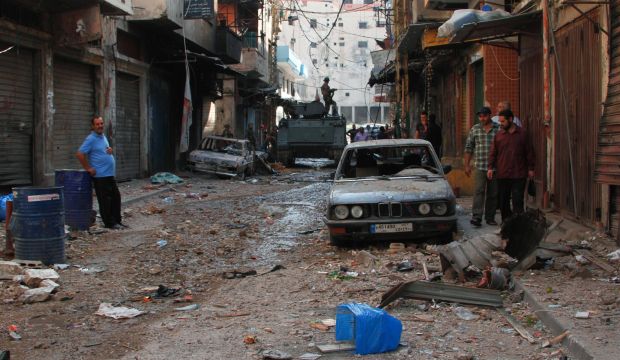
Residents look at debris following clashes between Lebanese soldiers and Islamist gunmen in Tripoli, northern Lebanon, on October 28, 2014. (Reuters/Omar Ibrahim)
Beirut, Asharq Al-Awsat—Dozens of Islamist fighters remain in hiding around the port city of Tripoli after the Lebanese military liberated it from control of the Islamic State of Iraq and Syria (ISIS) earlier this week, local sources told Asharq Al-Awsat.
A well-informed Lebanese military official, speaking to Asharq Al-Awsat on the condition of anonymity because he was not authorized to brief the press about ongoing military operations, said that as many as 500 Islamist militants had taken part in the four-day battle against Lebanese security and military forces.
At least 40 percent of the Islamist forces had been killed in the fighting, while a total of 190 fighters, most of them affiliated to ISIS, had been captured by Lebanese security forces, the source said. Lebanese military forces are continuing to pursue around 150 fighters affiliated to various Islamist forces in and around Tripoli.
“The bulk of the forces are believed to have fled the city [Tripoli] while others are hiding out in the city’s districts,” the Lebanese military official said. He said that the Islamist fighters, both those inside Tripoli and those on the run in the countryside beyond the port city, are likely seeking to flee across the border to neighboring Syria and join the ranks of ISIS there.
However, Islamist sources, also speaking to Asharq Al-Awsat on the condition of anonymity, warned that many of the Islamists had been Tripoli residents. “The fighters’ exit [from Tripoli] is not the end of the matter,” he said, warning that these fighters could seek to return as soon as the Lebanese military forces deployed in the strategically important port city left.
ISIS’s attempt to take control of Tripoli is the latest example of how the conflict across the border in Syria is affecting the Mediterranean country, which is increasingly seeking to distance itself from the Syrian conflict. Future Movement leader and former Lebanese prime minister Saad Al-Hariri called on Lebanon to disengage from the Syrian conflict on Tuesday.
“The itinerant incidents we are witnessing these days in the Beqaa Valley, Tripoli, Akkar, Minyeh, Danniyeh, and elsewhere, are a small sample of the huge fire that broke out in Syria,” Hariri said in a statement.
He called Lebanon’s moderate Sunnis to stand together and reject the extremist jihadism being propagated by ISIS and its ilk.
“All calls to defect from the army and incite the Sunni youth, in particular to leave their posts and join armed organizations in Lebanon or abroad, are condemned and rejected,” he said, warning of “suspicious plots” to replace the Lebanese state with “mini-states based on sectarianism.”
